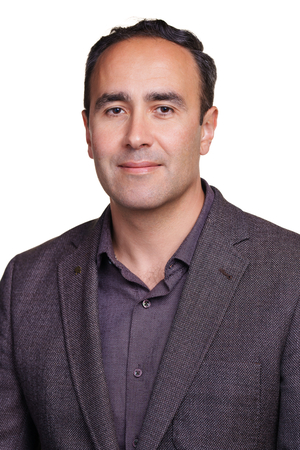Vardan T. Karamyan, Pharm.D., Ph.D
Professor in the Department of Foundational Medical Studies
Head, Laboratory for Neurodegenerative Disease and Drug Discovery

Dr. Karamyan joined the Oakland University William Beaumont School of Medicine in September of 2022 as a Professor in the Department of Foundational Medical Studies.
Dr. Karamyan received a Pharm.D. degree (Magna cum laude, 2000) from the Yerevan State Medical University, Faculty of Pharmacy (Armenia) and Ph.D. in Biology (2004), with emphasis in biochemistry and pharmacology, from the Institute of Biochemistry, National Academy of Sciences of Armenia. After completing a postdoctoral training in pharmacology at the Dept. of Pharmacology, School of Pharmacy, University of Mississippi, Dr. Karamyan joined the Dept. of Pharmaceutical Sciences, School of Pharmacy at Texas Tech University Health Sciences Center (TTUHSC) as a tenure-track Assistant Professor (2008). He advanced through the ranks and has been a Full Professor and Vice-Chair of the Pharmaceutical Sciences Department before joining the Oakland University William Beaumont School of Medicine.
As a pharmacist scientist, Dr. Karamyan’s research experience ranges from enzyme and receptor pharmacology, chemical biology and biochemistry to behavioral pharmacology, disease modeling, target identification and drug discovery in the fields of neurobiology, neurodegenerative and cardiovascular disorders. Dr. Karamyan has been privileged to obtain research funding from the National Institutes of Health (NIH) and the American Heart Association (AHA), and to train PhD students and post-docs in his laboratory. The results of their research have been published in reputable peer-reviewed journals and presented at local and international conferences. Students and trainees play primary roles in the research at the Karamyan Laboratory by direct involvement in the design, performance, analysis and presentation of the studies in an environment that is inclusive and fosters exchange of new ideas and academic success.
In addition to research, Dr. Karamyan is an accomplished educator and has been involved in didactic training of pharmacy and graduate students. His classroom teaching has been continuously recognized by students and faculty peers over the last decade.
Contact Information:
Office: Dodge Hall 154
118 Library Dr, Rochester, MI 48309
Phone: 248-370-4525
Email: vkaramyan@oakland.edu
Specialties:
Neurodegenerative and Cardiovascular Disorders, Enzyme and Receptor Pharmacology and Chemical Biology, Drug Discovery.
Education:
Pharm.D., Faculty of Pharmacy, Yerevan State Medical University.
Ph.D., Biology, Institute of Biochemistry, National Academy of Sciences of Armenia.
Research Interests:
Dr. Karamyan’s current research interests are primarily focused on three main projects:
1) Role of neuropeptides and associated systems in response of the brain to stressors like ischemia and physical trauma: a basic and translational pharmacology and drug discovery project focusing on acute neurodegenerative disorders; efforts/interests focus on peptidase neurolysin (Nln) and its peptide substrates, their role in modulation of the blood-brain barrier and response of the brain to ischemic and traumatic brain injury, and development of recombinant Nln analogs and small-molecule activators of Nln as potential therapeutic agents. We also have active interests in evaluating the role of Nln in pathophysiology of vascular dementias and Alzheimer’s disease, and studying the function of mitochondrial Nln in these pathophysiological conditions. Additional, interests include modulation of Nln expression by comorbidities and risk factors; activity enhancing and inhibiting point mutations of Nln and their potential association with cardio and cerebrovascular disorders; and the potential role of Nln and its peptide substrates in modulation of the blood-retinal barrier.
2) Allosteric activation of peptidases: a project involving structural biology and basic pharmacology of peptidases to identify and characterize small molecule activators/enhancers as potential drug leads; current efforts focus on neurolysin, ACE2 (angiotensin converting enzyme 2), neprilysin (aka neutral endopeptidase), ECE1 (endothelin converting enzyme 1) and insulin-degrading enzyme. Additional interests include understanding the shared mechanisms and structural requirements for allosteric modulation and enhanced catalytic activity of these peptidases, and applicability of such common features and general principles to other peptidases.
3) Chronic response of the brain to ischemia, neuroplasticity and neurorestoration/functional recovery: a basic and translational neuroscience project studying functional recovery after ischemic stroke; efforts/interests involve motor and cognitive recovery, biology of neural repair (angiogenesis, pericytes and infarct core) and identification of new drug targets, role of serotonergic and adrenergic systems in functional recovery, physical rehabilitation, intermittent fasting, and drug repurposing. Additional, interests include cardiovascular comorbidities (diabetes, hypertension, smoking) and post-stroke recovery; post-stroke vision impairment and recovery; and seizures and ischemic stroke – reciprocal risks, mechanisms and pharmacotherapy.
List of publications on PubMed: https://pubmed.ncbi.nlm.nih.gov/?term=karamyan+v&sort=date

